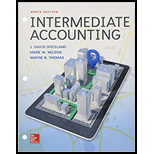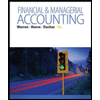
Concept explainers
(1)(a)
Financial Statements: Financial statements are condensed summary of transactions communicated in the form of reports for the purpose of decision making. The financial statements reports, and shows the financial status of the business. The financial statements consist of the
Liabilities: Liabilities are referred to as the obligations of the business towards the creditors for operating the business. Liabilities may be short-term or long-term depending upon the time duration in which it is paid back to the creditors. Liabilities are classified in to current liabilities and long-term liabilities. Current liabilities are those liabilities which need to be paid within a year. Long-term liabilities are those liabilities that have longer maturity period.
To provide: Four components of T’s current liabilities.
(1)(a)
Explanation of Solution
Four components of current liabilities are as follows:
| Current Liabilities | Amount ($ in millions) | |
| 1/30/2016 | 1/31/2015 | |
| Accounts payable | 7,418 | 7,759 |
| Accrued and other current liabilities | 4,236 | 3,783 |
| Current portion of LT debt & other borrowings | 815 | 91 |
| Liabilities of discontinued operations | 153 | 103 |
| Total current liabilities | 12,622 | 11,736 |
b.
Whether current assets are sufficient to cover current liabilities.
b.
Explanation of Solution
Yes, in both the years ended 1/30/2016 and 1/31/2015, current assets are sufficient to cover the current liabilities.
When both the year’s current ratio are compared, current ratio for 2016 is slightly lower than the previous year.
c.
To provide: Reason for company avoiding low current ratio.
c.
Explanation of Solution
Thumb-rule standard for current ratio is 1:1. When the current ratio is too low, it reveals that company does not have sufficient current assets to fulfill the current obligations. When current ratio is too high, then it reveals that company does not use its current assets and liabilities effectively. The capital of the company is tied up in cash, and
(2)(a)
To find out: Change in gift card liability between January 30, 2016 and January 31, 2015.
(2)(a)
Explanation of Solution
Thus, change in gift card liability between January 30, 2016 and January 31, 2015 is $32 million.
b.
Effect on the gift card liability due to given circumstances.
b.
Explanation of Solution
i. Sale of gift card
| Date | Account Title and Explanation | Post .Ref |
Debit ($) | Credit ($) |
| xxxx | Cash | XXX | ||
| Deferred revenue, gift cards | XXX | |||
| (To record the sale of gift cards.) | ||||
When sale of gift cards are considered,liability (deferred revenue) increases and cash increases. Thus, cash is debited and deferred revenue, gift cards are credited.
ii. Redemption of a gift card (the holder using it to acquire goods or services)
| Date | Account Title and Explanation | Post .Ref |
Debit ($) | Credit ($) |
| xxxx | Deferred revenue, gift cards | XXX | ||
| Revenue | XXX | |||
| (To record the redemption of gift cards.) | ||||
When redemption of gift cards are considered, deferred revenue, gift cards are decreased and revenue is increased. Thus, deferred revenue, gift cards is debited and revenue is credited.
iii. Increase in breakage estimated for gift cards already sold
| Date | Account Title and Explanation | Post .Ref |
Debit ($) | Credit ($) |
| xxxx | Deferred revenue, gift cards | XXX | ||
| Revenue | XXX | |||
| (To record the increase in breakage estimated for gift cards already sold.) | ||||
When redemption of gift cards are considered, deferred revenue, gift cards are decreased and revenue is increased. When there is increase in estimated breakage, the liability decreases. Only, few gift cards will be redeemed. Thus, deferred revenue, gift cards is debited and revenue is credited.
(3)(a)
The approach for accruing losses for litigation claims associated with the data breach.
(3)(a)
Explanation of Solution
T is making reasonable estimated as per probable outcomes. T does not believe the probability. T is making reasonable estimates based on the probable outcomes. T does not believe the probable cases and thus it is litigated. T’s accrual amount is probable and reasonable estimable.
b.
To prepare:
b.
Explanation of Solution
As per note 19 Data breach balance sheet roll forward, T recognizes new expenses and increases the liability totaling $39 million for the fiscal year ended January 30, 2016:
| Date | Account Title and Explanation | Post .Ref |
Debit ($) | Credit ($) |
| xxxx | Expense – Data Breach | 39 | ||
| Liability | 39 | |||
| (To record recognition of new expenses associated with the data breach litigation.) | ||||
Expense – Data Breach is an expense and reduces the
c.
To prepare: Journal entry to record T’s reduction of its liability associated with the data breach litigation for the fiscal year ended January 30, 2016.
c.
Explanation of Solution
As per note 19 Data breach balance sheet roll forward, T recognizes new payment and increases the liability totaling $130 million and reduces data breach liability for the fiscal year ended January 30, 2016:
| Date | Account Title and Explanation | Post .Ref |
Debit ($) | Credit ($) |
| xxxx | Liability – Data Breach | 130 | ||
| Cash | 130 | |||
| (To record reduction of its liability associated with the data breach litigation.) | ||||
Liabilities – Data breach decreases the amount of liabilities. Hence, debit liabilities with $130. Cash is decreased due to reduction of liability. Hence, credit Cash with $130.
Want to see more full solutions like this?
Chapter 13 Solutions
INTERMEDIATE ACCOUNTING(LL)-W/CONNECT
- Compare and contrast the procedures for lodging an objection in Jamaica with those of Trinidad and Tobago.arrow_forwardThe actual cost of direct labor per hour is $16.25 and the standard cost of direct labor per hour is $15.00. The direct labor hours allowed per finished unit is 0.60 hours. During the current period, 4,500 units of finished goods were produced using 2,900 direct labor hours. How much is the direct labor rate variance? A. $3,625 favorable B. $3,625 unfavorable C. $4,350 favorable D. $4,350 unfavorablearrow_forwardOn January 1 of the current year, Piper Company issues a 4-year, non-interest-bearing note with a face value of $8,000 and receives $4,952 in exchange. The recording of the issuance of the note includes a: a. credit to Notes Payable for $4,952. b. credit to Discount on Notes Payable for $3,048. c. debit to Discount on Notes Payable for $3,048. d. debit to Cash for $8,000.arrow_forward
- During September, the assembly department completed 10,500 units of a product that had a standard materials cost of 3.0 square feet per unit at $2.40 per square foot. The actual materials purchased consisted of 22,000 square feet at $2.60 per square foot, for a total cost of $57,200. The actual material used during this period was 25,500 square feet. Compute the materials price variance and materials usage variance.arrow_forwardBluesy Electronics recorded the following financial data: Net Sales $720,500 Average Inventory at Cost = $80,200 Gross Margin Percentage = 42% Calculate the GMROI.arrow_forwardNeed help this question solutionarrow_forward
 Intermediate Accounting: Reporting And AnalysisAccountingISBN:9781337788281Author:James M. Wahlen, Jefferson P. Jones, Donald PagachPublisher:Cengage Learning
Intermediate Accounting: Reporting And AnalysisAccountingISBN:9781337788281Author:James M. Wahlen, Jefferson P. Jones, Donald PagachPublisher:Cengage Learning Accounting (Text Only)AccountingISBN:9781285743615Author:Carl Warren, James M. Reeve, Jonathan DuchacPublisher:Cengage Learning
Accounting (Text Only)AccountingISBN:9781285743615Author:Carl Warren, James M. Reeve, Jonathan DuchacPublisher:Cengage Learning Survey of Accounting (Accounting I)AccountingISBN:9781305961883Author:Carl WarrenPublisher:Cengage Learning
Survey of Accounting (Accounting I)AccountingISBN:9781305961883Author:Carl WarrenPublisher:Cengage Learning AccountingAccountingISBN:9781337272094Author:WARREN, Carl S., Reeve, James M., Duchac, Jonathan E.Publisher:Cengage Learning,
AccountingAccountingISBN:9781337272094Author:WARREN, Carl S., Reeve, James M., Duchac, Jonathan E.Publisher:Cengage Learning, Financial & Managerial AccountingAccountingISBN:9781285866307Author:Carl Warren, James M. Reeve, Jonathan DuchacPublisher:Cengage Learning
Financial & Managerial AccountingAccountingISBN:9781285866307Author:Carl Warren, James M. Reeve, Jonathan DuchacPublisher:Cengage Learning Cornerstones of Financial AccountingAccountingISBN:9781337690881Author:Jay Rich, Jeff JonesPublisher:Cengage Learning
Cornerstones of Financial AccountingAccountingISBN:9781337690881Author:Jay Rich, Jeff JonesPublisher:Cengage Learning





